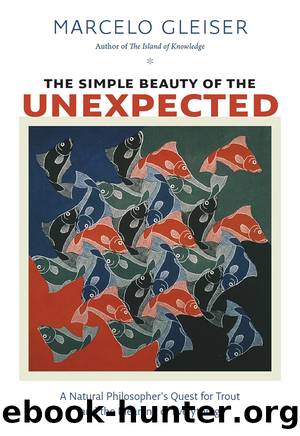The Simple Beauty of the Unexpected by Marcelo Gleiser

Author:Marcelo Gleiser
Language: eng
Format: epub
Publisher: University Press of New England
Love in a Time of Science
In time, our understanding of the cosmos changed. But not most people’s view of it. Natural philosophers were pushing for a new worldview, but people resisted. The new cosmic order did instill awe at the vastness of creation. But it also instilled fear—the fear of being alone in a godless Universe. Few expressed this as eloquently as the seventeenth-century French philosopher and mathematician Blaise Pascal, whose words predated Newton by decades: “When I consider the short duration of my life, swallowed up in the eternity before and after the little space that I fill, and even can see, engulfed in the infinite immensity of spaces of which I am ignorant, and which know me not, I am frightened, and am astonished at being here rather than there, why now rather than then. Who has put me here? By whose order and direction have this place and time been allotted to me?” The more science advanced, the less necessary an all-powerful God became. “I have no need for this hypothesis,” uttered the astronomer and mathematician Simon de Laplace to Napoleon, reacting to the emperor’s surprise at not finding any reference to the Creator in Laplace’s Celestial Mechanics, published in five volumes between 1799 and 1825. The cosmos became a precise machine, clockwork unwinding according to strict mathematical laws. God’s role was relegated to that of the clock maker, the maker of laws: once God created the world, it would follow its deterministic course without any further need for divine intervention. Needless to say, believers didn’t take this very lightly. Could science really go this far in explaining the world, leaving out only a single mystery, the mystery of creation? A God whose only job was to create the world was a distant God, impersonal and uncaring. And what of free will? If the laws of Nature predetermined the unfolding of all events, no action or choice was truly free: the time you were born, which person you’d marry, your profession, your trials and tribulations . . . everything would be already written in the book of time. We would be mere automatons, blindly believing in our autonomy as individuals, when in fact our freedom was a mere illusion. In a clockwork cosmos we would be no more than puppets in a drama played on the cosmic stage, director unknown.
To make things worse, as if on cue, came Darwin’s heavy blow. We are just evolved apes with shrunken tails, the evidence led him to conclude, not quite the semblance one would expect from creatures made in God’s image. Many felt—and still feel—that science had robbed them of God and offered nothing but cold materialism in return. How could we sate our spiritual hunger in a clockwork cosmos, where everything seemed reducible to cold mathematical logic and precise physical laws? Where did love fit in this picture? You can’t really blame the Romantics for revolting against this excessive rationalism.
This is the rift that has never been healed, the great spiritual void of our scientific age.
Download
This site does not store any files on its server. We only index and link to content provided by other sites. Please contact the content providers to delete copyright contents if any and email us, we'll remove relevant links or contents immediately.
Backpacker the Complete Guide to Backpacking by Backpacker Magazine(1815)
The Isle of Mull by Terry Marsh(1517)
Capital in the Twenty-First Century by Thomas Piketty(1418)
Predation ID Manual by Kurt Alt(1311)
The Collected Non-Fiction by George Orwell(1306)
Small-Bore Rifles by C. Rodney James(1270)
Creative Confidence by Tom Kelley(1140)
Backcountry Bear Basics by Dave Smith(1128)
All Fishermen Are Liars by John Gierach(1112)
50 Famous Firearms You've Got to Own by Rick Hacker(1101)
Blood Mountain by J.T. Warren(1089)
The Art of Throwing by Amante P. Marinas Sr(1076)
Archery: The Art of Repetition by Simon Needham(1065)
Long Distance Walking in Britain by Damian Hall(1052)
Backpacker Long Trails by Backpacker Magazine(1031)
The Fair Chase by Philip Dray(980)
The Ultimate Shooting Skills Manual: 212 Essential Range and Field Skills (Outdoor Life) by The Editors of Outdoor Life(963)
The Real Wolf by Ted B. Lyon & Will N. Graves(956)
The Ultimate Guide to Home Butchering by Monte Burch(948)
